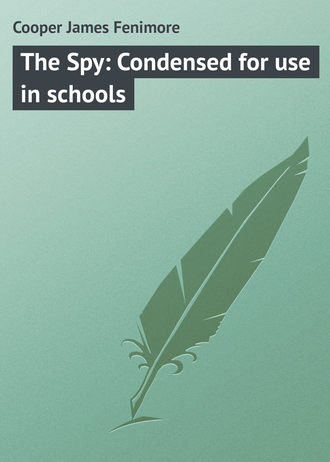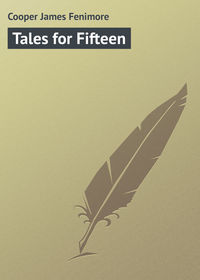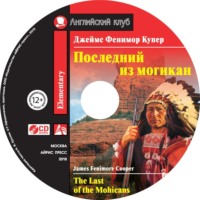 полная версия
полная версияThe Spy: Condensed for use in schools
“What a magnificent scene!” said Harper, in a low tone; “how grand! how awfully sublime! May such a quiet speedily await the struggle in which my country is engaged, and such a glorious evening follow the day of her adversity!”
“There can be no danger apprehended from such a man,” thought Frances; “such feelings belong only to the virtuous.”
The musings of the party were now interrupted by the sudden appearance of the peddler. “Fine evening,” he said, saluting the party, without raising his eyes; “quite warm and agreeable for the season.”
Mr. Wharton assented to the remark, and inquired kindly after the health of his father. Harvey answered with a slight tremor in his voice:
“He fails fast; old age and hardships will do their work.” The peddler turned his face from the view of most of the family, but Frances noticed his glistening eyes and quivering lips, and for the second time Harvey rose in her estimation.
The valley in which the residence of Mr. Wharton stood ran in a direction from northwest to southeast, and the house was placed on the side of a wall which terminated31 its length in the former direction. A small opening, occasioned by the receding of the opposite hill, and the fall of the land to the level of the tide water, afforded a view of the Sound32 over the tops of the distant woods on its margin. The surface of the water, which had so recently been lashing the shores with boisterous fury, was already losing its ruffled darkness in the long and regular undulations33 that succeed a tempest, while the light air from the southwest was gently touching their summits, lending its feeble aid in stilling the waters. Some dark spots were now to be distinguished, occasionally rising into view, and again sinking behind the lengthened waves which interposed themselves to the sight. They were unnoticed by all but the peddler. He seated himself on the piazza, at a distance from Harper, and appeared to have forgotten the object of his visit. His roving eye, however, soon caught a glimpse of these new objects in the view, and springing up with alacrity34 gazed intently towards the water. He changed his place, glanced his eye with marked uneasiness on Harper, and then said with great emphasis:
“The rig’lars must be out from below.”
“Why do you think so?” inquired Captain Wharton, eagerly. “God send it may be true; I want their escort in again.”
“Them ten whaleboats would not move so fast unless they were better manned than common.”
“Perhaps,” cried Mr. Wharton in alarm, “they are – they are Continentals returning from the island.”
“They look like rig’lars,” said the peddler, with meaning.
“Look!” repeated the captain, “there is nothing but spots to be seen.”
Harvey, disregarding his observation, said in an undertone, “They came out before the gale – have laid on the island these two days – horse are on the road – there will soon be fighting near us.” During this speech, Birch several times glanced towards Harper, with evident uneasiness, who stood in silent contemplation35 of the view, and seemed enjoying the change in the air. As Birch concluded, however, Harper turned to his host, and mentioned that his business would not admit of unnecessary delay; he would, therefore, avail himself of the fine evening to ride a few miles on his journey. Mr. Wharton made many professions of regret, but was too mindful of his duty not to speed the parting guest, and orders were instantly given to that effect.
Every preparation being completed, Harper proceeded to take his leave. There was a mutual exchange of polite courtesy between the host and his parting guest; but as Harper frankly offered his hand to Captain Wharton, he remarked, in a manner of great solemnity:
“The step you have undertaken is one of much danger, and disagreeable consequences to yourself may result from it; in such a case, I may have it in my power to prove the gratitude I owe your family for its kindness.”
“Surely, sir,” cried the father, “you will keep secret the discovery which your being in my house has enabled you to make?”
Harper turned quickly to the speaker, and answered mildly, “I have learned nothing in your family, sir, of which I was ignorant before; but your son is safer from my knowledge of his visit than he would be without it.”
He bowed to the whole party, and without taking any notice of the peddler, other than by simply thanking him for his attentions, mounting his horse, and riding steadily and gracefully through the little gate, was soon lost behind the hill which sheltered the valley to the northward.
All the members of the Wharton family laid their heads on their pillows that night with a foreboding of some interruption to their ordinary quiet. Uneasiness kept the sisters from enjoying their usual repose, and they rose from their beds, on the following morning, unrefreshed and almost without having closed their eyes.
The family were already assembled around the breakfast table when the captain made his appearance, though the untasted coffee sufficiently proved that by none of his relatives was his absence disregarded.
“I think I did much better,” he cried, taking a chair between his sisters, and receiving their offered salutes, “to secure a good bed and such a plentiful breakfast, instead of trusting to the hospitality36 of that renowned corps, the Cow-Boys.”
“If you could sleep,” said Sarah, “you were more fortunate than Frances and myself. Every murmur of the night air sounded to me like the approach of the rebel army.”
“Why,” said the captain, laughing, “I do acknowledge a little inquietude37 myself. But how was it with you?” turning to his younger and evidently favorite sister, and tapping her cheek; “did you see banners in the clouds, and mistake Miss Peyton’s Æolian38 harp for rebellious music?”
“Nay, Henry,” rejoined the maid, “much as I love my country, the approach of her troops just now would give me great pain.”
The brother made no reply; when Cæsar exclaimed, with a face that approached something like the hues of a white man:
“Run, Massa Harry, run – if he love old Cæsar, run. Here come a rebel horse.”
“Run!” repeated the British officer, gathering himself up in military pride; “no, Mr. Cæsar, running is not my trade.” While speaking, he walked deliberately to the window, where the family were already collected in the greatest consternation.39
CHAPTER IV.
CAPTAIN WHARTON’S CAPTURE
At the distance of more than a mile about fifty dragoons were to be seen, winding down one of the lateral40 entrances of the valley. In advance, with an officer, was a man attired in the dress of a countryman, who pointed in the direction of the cottage. A small party now left the main body and moved rapidly toward the object of their destination.
On reaching the road which led through the bottom of the valley, they turned their horses’ heads to the north.
Reaching the dwelling of Birch, they made a rapid circle around his grounds, and in an instant his house was surrounded by a dozen sentinels.
Two or three of the dragoons now dismounted and disappeared; in a few minutes they returned to the yard, followed by Katy, from whose violent gesticulations41 it was evident that matters of no trifling concern were on the carpet. A short communication with the housekeeper followed the arrival of the main body of the troop, and the advancing party remounting, the whole moved towards the Locusts with great speed.
As yet none of the family had sufficient presence of mind to devise any means of security for Captain Wharton; but the danger now became too pressing to admit of longer delay, and various means of secreting him were hastily proposed.
At length his sisters, with trembling hands, replaced his original disguise. This arrangement was hastily and imperfectly completed as the dragoons entered the lawn and orchard of the Locusts, riding with the rapidity of the wind; and in their turn the Whartons were surrounded.
The leader of the horse dismounted, and, followed by a couple of his men, he approached the outer door of the building, which was slowly opened for his admission by Cæsar.
A man, whose colossal42 stature manifested the possession of vast strength, entered the room, and, removing his cap, he saluted the family with a mildness his appearance did not indicate as belonging to his nature. His dark hair hung around his brow in profusion, though stained with the powder that was worn at that day, and his face was nearly hid in the whiskers by which it was disfigured. Still the expression of his eye, though piercing, was not bad, and his voice, though deep and powerful, was far from unpleasant. Frances ventured to throw a timid glance at his figure as he entered, and saw at once the man from whose scrutiny Harvey Birch had warned them there was so much to be apprehended.
“You have no cause for alarm, ladies,” said the officer; “my business will be confined to a few questions, which, if freely answered, will instantly remove us from your dwelling.
“Has there been a strange gentleman staying with you during the storm?” continued the dragoon, speaking with interest.
“This gentleman – here – favored us with his company during the rain, and has not yet departed.”
“This gentleman!” repeated the other, turning to Captain Wharton. He approached the youth with an air of comic gravity, and, with a low bow, continued, “I am sorry for the severe cold you have in your head, sir.”
“I!” exclaimed the captain, in surprise; “I have no cold in my head.”
“I fancied it, then, from seeing you had covered such handsome black locks with that ugly old wig. It was my mistake; you will please to pardon it.”
Mr. Wharton groaned aloud; but the ladies, ignorant of the extent of the visitor’s knowledge, remained in trembling yet rigid silence. The captain himself moved his hand involuntarily to his head, and discovered that the trepidation of his sisters had left some of his natural hair exposed. The dragoon watched the movement with a continued smile, when, seeming to recollect himself, turning to the father, he proceeded:
“Then, sir, I am to understand there has not been a Mr. Harper here within a week?”
“Mr. Harper,” echoed the other; “yes – I had forgotten; but he is gone, and if there be anything wrong in his character, we are in entire ignorance; to me he was a total stranger.”
“You have little to apprehend from his character,” answered the dragoon, dryly; “but he is gone – how, when, and whither?”
“He departed as he arrived,” said Mr. Wharton, gathering renewed confidence from the manner of the trooper, “on horseback last evening, and he took the northern road.”
The officer listened with intense interest, his countenance gradually lighting with a smile of pleasure, and the instant Mr. Wharton concluded his laconic43 reply he turned on his heel and left the apartment. In a few moments orders were given to some of the troop, and horsemen left the valley, at full speed, by its various roads.
The suspense of the party within, who were all highly interested witnesses of this scene, was shortly terminated; for the heavy tread of the dragoon soon announced his second approach. He bowed again politely as he reëntered the room, and, walking up to Captain Wharton, said with mock gravity:
“Now, sir, my principal business being done, may I beg to examine the quality of that wig?”
The British officer imitated the manner of the other, as he deliberately uncovered his head, and handing the wig observed, “I hope, sir, it is to your liking.”
“I cannot, without violating the truth, say it is,” returned the dragoon; “I prefer your ebony hair, from which you seem to have combed the powder with great industry. But that must have been a sad hurt you have received under this enormous black patch.”
“You appear such a close observer of things, that I should like your opinion of it, sir,” said Henry, removing the silk, and exhibiting the cheek free from blemish.
“Upon my word, you improve most rapidly in externals,” added the trooper; “if I could but persuade you to exchange this old surtout44 for that handsome blue coat by your side, I think I never could witness a more agreeable metamorphosis,45 since I was changed myself from a lieutenant to a captain.”
Young Wharton very composedly did as he was required, and stood an extremely handsome, well-dressed young man. The dragoon looked at him for a minute with the drollery that characterized his manner, and then continued:
“This is a newcomer in the scene; it is usual, you know, for strangers to be introduced; I am Captain Lawton, of the Virginia horse?”
“And I, sir, am Captain Wharton, of his Majesty’s Sixtieth regiment of foot,” returned Henry, bowing stiffly, and recovering his natural manner.
The countenance of Lawton changed instantly, and his assumed quaintness vanished. He viewed the figure of Captain Wharton, as he stood proudly swelling with a pride that disdained further concealment, and exclaimed with great earnestness:
“Captain Wharton, from my soul I pity you!”
“Oh, then,” cried the father, in agony, “if you pity him, dear sir, why molest him? He is not a spy; nothing but a desire to see his friends prompted him to venture so far from the regular army, in disguise. Leave him with us; there is no reward, no sum, which I will not cheerfully pay.”
“Sir, your anxiety for your friend excuses your language,” said Lawton, haughtily; “but you forget I am a Virginian, and a gentleman.” Turning to the young man, he continued, “Were you ignorant, Captain Wharton, that our pickets have been below you for several days?”
“I did not know it until I reached them, and it was too late to retreat,” said Wharton, sullenly. “I came out, as father has mentioned, to see my friends, understanding your parties to be at Peekskill,46 and near the Highlands, or surely I would not have ventured.”
“All this may be very true; but the affair of André has made us on the alert. When treason reaches the grade of general officers, Captain Wharton, it behooves47 the friends of liberty to be vigilant.”
Henry bowed to this remark in distant silence, but Sarah ventured to urge something in behalf of her brother. The dragoon heard her politely, and answered mildly:
“I am not the commander of the party, madam; Major Dunwoodie will decide what must be done with your brother. At all events, he will receive nothing but kind and gentle treatment. May I presume so far as to ask leave to dismount and refresh my men, who compose a part of his squadron?”
There was a manner about the trooper that would have made the omission of such a request easily forgiven by Mr. Wharton; but he was fairly entrapped by his own eagerness to conciliate, and it was useless to withhold a consent which he thought would probably be extorted; he therefore made the most of necessity, and gave such orders as would facilitate48 the wishes of Captain Lawton.
CHAPTER V.
DUNWOODIE’S INVESTIGATION
After sufficient time had passed to make a very comfortable meal, a trumpet suddenly broke on the ears of the party, sending its martial tones up the valley, in startling melody. The trooper rose instantly from the table, exclaiming:
“Quick, gentlemen, to your horses; there comes Dunwoodie;” and, followed by his officers, he precipitately49 left the room.
With the exception of the sentinels left to guard Captain Wharton, the dragoons mounted, and marched out to meet their comrades.
In the advancing troop, one horseman seemed to be distinguished in particular from those around him. Even the steed of this youthful soldier seemed to be conscious that he sustained the weight of no common man. The dragoon sat in the saddle with a firmness and ease that showed him master of himself and horse, his figure uniting the just proportions of strength and activity, being tall, round, and muscular. To this officer Lawton made his report, and side by side they rode into the field opposite to the cottage.
The officer gave a few hasty orders to his second in command, walked rapidly into the lawn, and approached the cottage. The dragoon ascended the steps of the piazza, and had barely time to touch the outer door, when it opened to his admission.
Frances silently led the way into a vacant parlor, opposite to the one in which the family were assembled, and turning to the soldier frankly, placing both her hands in his own, exclaimed:
“Ah, Dunwoodie, how happy on many accounts I am to see you! I have brought you in here to prepare you to meet an unexpected friend in the opposite room.”
“To whatever cause it may be owing,” cried the youth, pressing her hands to his lips, “I, too, am happy in being able to see you alone. Frances, the probation50 you have decreed is cruel; war and distance may separate us forever.”
“We must submit to the necessity which governs us. But it is not love speeches I would hear now: I have other and more important matter for your attention.”
“What can be of more importance than to make you mine by a tie that will be indissoluble!51 Frances, you are cold to me – me – from whose mind, days of service and nights of alarm have never been able to banish your image for a single moment.”
“Dear Dunwoodie,” said Frances, softening nearly to tears, “you know my sentiments. This war once ended, and you may take my hand forever; but I cannot consent to tie myself to you by any closer union, so long as you are arrayed against my only brother. Even now, that brother is waiting your decision to restore him to liberty, or to conduct him to a probable death.”
“Your brother!” cried Dunwoodie, starting and turning pale; “Frances! what can I do?”
“Do!” she repeated, gazing at him wildly; “would Major Dunwoodie yield to his enemies his friend, the brother of his betrothed wife? Do you think I can throw myself into the arms of a man whose hands are stained with the blood of my only brother!”
“Frances, you wring my very heart; but, after all, we may be torturing ourselves with unnecessary fears, and Henry, when I know the circumstances, may be nothing more than a prisoner of war; in which case, I can liberate him on parole.”
Frances now led the way to the opposite room. Dunwoodie followed her reluctantly, and with forebodings of the result.
The salutations of the young men were cordial and frank, and, on the part of Henry Wharton, as collected as if nothing had occurred to disturb his self-possession.
After exchanging greetings with every member of the family, Major Dunwoodie beckoned to the sentinel to leave the room. Turning to Captain Wharton, he inquired mildly:
“Tell me, Henry, the circumstances of this disguise in which Captain Lawton reports you to have been found; and remember – remember – Captain Wharton, your answers are entirely voluntary.”
“The disguise was used by me, Major Dunwoodie,” replied the English officer, gravely, “to enable me to visit my friends without incurring the danger of becoming a prisoner of war.”
“But you did not wear it until you saw the troop of Lawton approaching?”
“Oh, no!” interrupted Frances, eagerly, “Sarah and myself placed them on him when the dragoons appeared; it was our awkwardness that led to the discovery.”
The countenance of Dunwoodie brightened, as, turning his eyes in fondness on the speaker, he listened to her explanation.
“Probably some articles of your own,” he continued, “which were at hand, and were used on the spur of the moment.”
“No,” said Wharton, with dignity; “the clothes were worn by me from the city; they were procured for the purpose to which they were applied, and I intended to use them again in my return this very day.”
“But the pickets – the party at the Plains?” added Dunwoodie, turning pale.
“I passed them, too, in disguise. I made use of this pass, for which I paid; and, as it bears the name of Washington, I presume it is forged.”
Dunwoodie caught the paper eagerly, and stood gazing on the signature for some time in silence, during which the soldier gradually prevailed over the man; then he turned to the prisoner with a searching look, as he asked:
“Captain Wharton, whence did you procure this paper?”
“This is a question, I conceive, Major Dunwoodie has no right to ask.”
“Your pardon, sir; my feelings may have led me into an impropriety. This name is no counterfeit. Captain Wharton, my duty will not suffer me to grant you a parole; you must accompany me to the Highlands.”
“I did not expect otherwise, Major Dunwoodie.”
“Major Dunwoodie,” said Frances, “I have already acknowledged to you my esteem; I have promised, Dunwoodie, when peace shall be restored to our country, to become your wife; give my brother his liberty on parole, and I will this day go with you to the altar, follow you to the camp, and, in becoming a soldier’s bride, learn to endure a soldier’s privations.”
Dunwoodie seized the hand which the blushing girl extended towards him, and pressed it for a moment to his bosom; he paced the room in excessive agitation.
“Frances, say no more, I conjure you, unless you wish to break my heart.”
“Then you reject my proffered hand?” she said, rising with dignity.
“Reject it! Have I not sought it with entreaties, with tears? But to take it under such conditions would be to dishonor both. Henry must be acquitted; perhaps not tried. No intercession of mine shall be wanting, you must well know; and believe me, Frances, I am not without favor with Washington.”
“That paper, that abuse of his confidence, will steel him to my brother’s case. If threats or entreaties could move his stern sense of justice, would André have suffered?” As Frances uttered these words, she fled from the room in despair.
Dunwoodie remained for a minute nearly stupefied; and then he followed with a view to vindicate52 himself, and to relieve her apprehensions. On entering the hall that divided the two parlors, he was met by a ragged boy, who looked one moment at his dress, and placing a piece of paper in his hands, immediately vanished through the outer door of the building. The soldier turned his eyes to the subject of the note. It was written on a piece of torn and soiled paper, and in a hand barely legible; but, after much labor, he was able to make out as follows:
“The rig’lars are at hand, horse and foot.”
Dunwoodie started; and, forgetting everything but the duties of a soldier, he precipitately left the house. While walking rapidly towards the troops, he noticed on a distant hill a vidette53 riding with speed; several pistols were fired in quick succession, and the next instant the trumpets of the corps rang in his ears with the enlivening strain of “To arms.” By this time he had reached the ground occupied by his squadron; the major saw that every man was in active motion. Lawton was already in the saddle, eying the opposite extremity of the valley with the eagerness of expectation.
CHAPTER VI.
THE SKIRMISH AND ESCAPE OF CAPTAIN WHARTON
The videttes and patrols now came pouring in, each making in succession his hasty report to the commanding officer, who gave his orders coolly and with a promptitude that made obedience certain.
Major Dunwoodie had received from his scouts all the intelligence concerning the foe which was necessary to enable him to make his arrangements. The bottom of the valley was an even plain, that fell with a slight inclination from the foot of the hills on either side to the level of a natural meadow that wound through the country on the banks of a small stream. This brook was easily forded, and the only impediment it offered to the movements of the horse was in a place where its banks were more steep and difficult of access than common. Here the highway crossed it by a rough wooden bridge.
The hills on the eastern side of the valley were abrupt, and frequently obtruded themselves in rocky prominences into its bosom. One of these projections was but a short distance in the rear of the squadron of dragoons, and Dunwoodie directed Captain Lawton to withdraw with two troops behind its cover. Dunwoodie knew his man, and had selected the captain for this service both because he feared his precipitation in the field, and knew, when needed, his support would never fail to appear. On the left of the ground on which Dunwoodie intended to meet his foe was a close wood, which skirted that side of the valley for the distance of a mile. Into this, then, the guides retired, and took their station near its edge, in such a manner as would enable them to maintain a scattering but effectual fire on the advancing column of the enemy.









